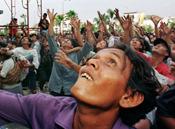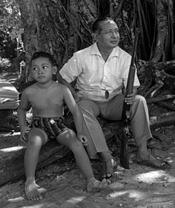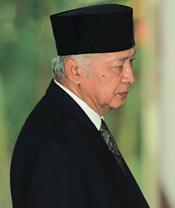| INDONESIA'S KILLING FIELDS. REMEMBERING SUHARTO'S BLOODY RISE TO POWER 32 YEARS AGO. TIME Daily, By Tony Karon The rioters who trashed Jakarta all of this week were mostly not yet bornwhen power last changed hands in Indonesia. And perhaps it is theirgenerational distance from the bloodletting that accompanied then-generalSuharto's October 1965 coup that allows them to summon the courage to sovocally demand his ouster. One million people -- primarily communists and Indonesians of Chineseorigin -- are estimated to have been slaughtered in the months followingSuharto's overthrow of President Sukarno. Described by the CIA as "one ofthe ghastliest and most concentrated bloodlettings of current times," itwas Indonesia's equivalent of Cambodia's "Killing Fields." Yet, there hasbeen remarkably little historical appraisal of how the slaughtertranspired, let alone calls for the perpetrators to be brought to justice. Reasons for that silence include Indonesians' fear of the authoritarianSuharto, the complicity of many of them in the butchery, and thebreak-a-few-eggs ethos of the Cold War. Unlike the Khmer Rouge, Suharto'sarmy did not monopolize the killing duties -- it also whipped up a frenzyof anti-communist, anti-Chinese sentiment and then distributed arms andlists of suspected communists to civilian Indonesians, urging them to wipeout the country's 3.5 million-strong Communist Party (PKI). Suharto'swilling executioners, then, may number in the tens if not hundreds of thousands. The West remained silent as Indonesia's army and its civilian militia wentfrom town to town, rounding up suspected communists and ordering them todig their own graves before killing them; sometimes decapitating the bodiesand displaying the skulls. Teachers and other civic leaders were forced todraw up death lists of influential townsfolk (which many of them did inorder to save themselves and others); while, in the words of a subsequentBritish intelligence report, the victims were "often no more than bewilderedpeasants who give the wrong answer on a dark night to bloodthirstyhooligans bent on violence." Eventually -- whipped up by the officialanti-Beijing propaganda -- the mobs turned on masses of apoliticalIndonesians of Chinese origins. Robert F. Kennedy's was a lone voice when he said, at the height of theputsch, "We have spoken out against inhuman slaughters perpetrated by theNazis and the communists. But will we speak out also against the inhumanslaughter in Indonesia, where over 100,000 alleged communists have been notperpetrators, but victims?" Most of Washington wasn't going to lose anysleep over dead Reds; not in 1965, the year U.S. combat troops firstarrived in Viet Nam. Indonesia, after all, was a critical "domino" and hadbeen saved by Suharto from falling to the Chinese. Caught in a swirl of social and economic turmoil, President Sukarno -- thenationalist-minded first president of independent Indonesia -- had governedby playing the military and the increasingly influential communists offagainst each other. It was a center that could not hold, and while the Westlooked to its allies in the military to hold the line against furthercommunist advance in Asia, Beijing rubbed its hands in anticipation of thePKI delivering Indonesia into Sino-communist orbit. The exact events surrounding the overthrow of President Sukarno remainshrouded in mystery. The official account has Suharto stepping in to savethe nation from a coup planned by leftist officers backed by the PKI.Others have suggested that those events may have been orchestrated bySuharto to generate support for his seizure of power. There is lessambiguity, however, about what followed: the brutal elimination in thespace of few months of masses of suspected communists and ethnic Chinese. The carnage left Suharto firmly entrenched in power, his strongestopponents physically eliminated and the broader population cowed intosubmission. For 31 years, challenges to the strongman have been few andisolated, as the country -- Suharto's immediate family more than most --enjoyed the fruits of rapid economic growth under his firm tutelage. Butwith the economic bubble burst and the country once again teetering inturmoil, Suharto's wheel may have come full circle. The passing of the ColdWar renders unlikely a repeat of the massacres of three decades ago, butone outcome of the present turmoil may be that Indonesia finally gets toreexamine the most brutal chapter of its modern history. |
BACK
| Copyright © 1998 INDO CHAOS All rights reserved. |


